Scientific Advisory Board
The Lobular Breast Cancer Alliance (LBCA) is grateful for its esteemed volunteer Scientific Advisory Board
The LBCA Scientific Advisory Board (SAB) is an internationally renowned group of clinicians and scientists with expertise in invasive lobular carcinoma (ILC) research. The SAB members are invaluable to the organization. They are passionately committed to LBCA’s mission, vision, and goals and are a critical resource for LBCA helping us to ensure that all information developed and shared is current, relevant, and accurate.
SAB members are our ambassadors in the scientific community and help LBCA provide current information about ILC research and clinical trials effectively and in lay terms. Together with LBCA staff and the Board of Directors, SAB members provide strategic guidance and assist with the implementation of LBCA’s planned research advocacy, ILC education, and ILC research grantmaking activities. They assist LBCA in identifying the priority areas for ILC research, and they help ensure that we advance the most important research efforts in these areas.
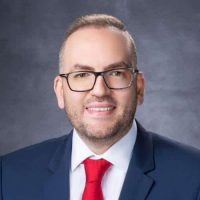
Jason A. Mouabbi, MD, LBCA SAB Chair, Assistant Professor of Oncology in the Department of Breast Medical Oncology at The University of Texas MD Anderson Cancer Center, Houston, Texas, has a research interest focused on highlighting the differences between invasive lobular carcinoma (ILC) and invasive ductal carcinoma (IDC). He also works to understand the ILC tumor microenvironment at the cellular, molecular and genetic levels to identify promising therapeutics that can be studied in clinical trials to help advance the care of people with ILC.
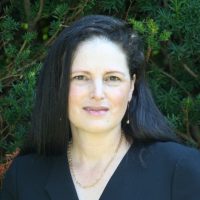
Rinath Jeselsohn, MD, LBCA SAB Immediate Past Chair, Assistant Professor of Medicine at Harvard Medical School, Associate Physician of Medicine at Brigham and Women’s Hospital, and Medical Oncologist at Dana-Farber Cancer Institute, has been engaged in breast cancer research for over a decade and currently focuses on the mechanisms of treatment resistance and tumor progression in hormone receptor positive breast cancer. A practicing clinician, Dr. Jeselsohn is also the lead investigator for clinical trials that she designed based on findings from her research and with the goal of finding new treatments for those with breast cancer.

Patrick W.B. Derksen, PhD, University Medical Center Utrecht, Netherlands, Department of Pathology, is a molecular cancer biologist focused on cell adhesion receptors and how they control invasive breast cancer. During his postdoctoral research he was the first to demonstrate a causal link between loss of adhesion between ductal breast cells and the development of ILC. He has a strong track record in mouse and human models of metastatic breast cancer. Based on these tools, his group is working hard to better understand the biochemical wiring of lobular cancer cells to develop effective targeted interventions.

Rachel C. Jankowitz, MD, Associate Professor of Clinical Medicine in the Division of Hematology/Oncology at the Perelman School of Medicine at the University of Pennsylvania, and Director of the Rena Rowan Breast Center at the Penn Abramson Cancer Center, has a clinical practice focused on care of patients with breast cancer. Her research has centered around invasive lobular breast cancer (ILC), endocrine resistance in hormone receptor positive breast cancer, and breast cancer clinical trials. She has served as primary investigator and/or co-investigator for many breast cancer clinical trials, and is inactive investigator in the Translational Breast Cancer Research Consortium. Dr. Jankowitz is particularly interested in biomarker development and treatment response in patients with ILC.

Maxine Jochelson, MD, Director of Imaging at the Evelyn Lauder Breast and Imaging Center at Memorial Sloan Kettering Cancer Center and Attending Radiologist and Clinical Professor of Radiology at Cornell Weill Medical School, is a graduate of New York Medical College, and completed her medical internship and radiology residency at Los Angeles County Hospital USC Medical Center. She did a clinical and research fellowship in Oncologic Radiology at the Dana Farber Cancer Institute and Brigham and Women’s Hospital at Harvarad Medical School. More …

Megan Kruse, MD, Breast Medical Oncologist at the Taussig Cancer Institute of Cleveland Clinic, received her medical degree from Case Western Reserve University in Cleveland, Ohio, and completed her residency in Internal Medicine at the University of Pittsburgh Medical Center. She then completed a hematology and medical oncology fellowship at Cleveland Clinic where she served as Chief Fellow and was appointed as Associate Staff in 2017. Her main area of clinical investigation is optimization of care for patients with lobular breast cancer with a special focus on the role of the immune microenvironment. She is a member of the National Cancer Institute Breast Immuno-Oncology (BIO) Task Force, NRG Oncology Breast Cancer Committee, NRG Oncology Translational Research Committee and NSABP Foundation Core Research Committee. She also has an interest in medical education and serves as the Associate Program Director of the Hematology/Oncology Fellowship at Cleveland Clinic. Dr. Kruse is happy to see any patients with lobular breast cancer who are interested in making a connection. Cleveland Clinic schedules patients through their Cancer Answer Line at 866-223-8100.
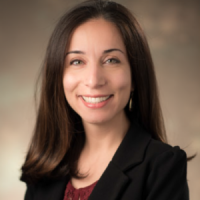
Rita Mukhtar, MD, Associate Professor of Clinical Surgery and Associate Program Director, General Surgery at the University of California, San Francisco, is a fellowship trained breast surgical oncologist with a research focus on ILC. Her work on surgical outcomes in ILC and novel imaging tools for ILC is currently supported by the American Cancer Society. She trained under Dr. Laura Esserman, during which time she studied the role of inflammatory cells in breast cancer. She maintains a busy clinical practice in breast surgery and acute care surgery.

Shani Paluch-Shimon, MD, Breast Oncology Program Director, Hadassah University Hospital, Jerusalem, is a medical oncologist with a Masters in Epidemiology from the London School of Hygiene & Tropical Medicine. She was the first to establish dedicated services for the care and treatment of young women with breast cancer in Israel. Dr. Paluch-Shimon’s key areas of clinical interest and research are breast cancer in young women, BRCA-associated breast cancer, triple-negative breast cancer, and health disparities amongst women with breast cancer. More …
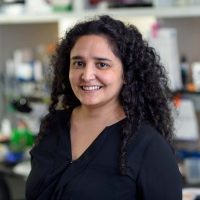
Fresia Pareja, MD, PhD, Assistant Attending in the Department of Pathology and Laboratory Medicine, Memorial Sloan Kettering Cancer Center is a practicing breast pathologist and physician-scientist passionate about the molecular characterization of special histologic subtypes of breast cancer, such as lobular breast cancer. She is interested in the integration of genomics, pathology, and artificial intelligence for the development of diagnostic tools for
lobular breast cancer and the discovery of novel biology underpinning this entity.
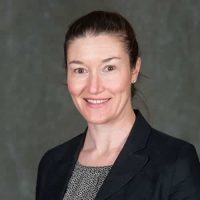
Rebecca B. Riggins, PhD, Associate Professor of Oncology and Associate Director of Education and Training, Georgetown Lombardi Comprehensive Cancer Center (LCCC), received a B.A. in Biochemistry from Hood College, and a PhD in Microbiology from the University of Virginia. Following postdoctoral fellowship training in Tumor Biology at Georgetown University, she joined the Department of Oncology at Georgetown University Medical Center’s LCCC, where she is an Associate Professor and member of the Breast Cancer Research Program.

Mothaffar Rimawi, MD is a board-certified medical oncologist and translational clinical researcher. He is the Associate Director for Clinical Affairs and Executive Medical Director of the Dan L Duncan Comprehensive Cancer Center at the Baylor College of Medicine. His research focuses on translation of preclinical discoveries by conducting biologically rational, biospecimen-intense targeted therapy clinical trials with associated tissue-based biomarker studies. He discovered and developed several biomarkers of response and resistance to therapy in breast cancer making him a leader in development and delivery of precision oncology approaches. His work helped advance clinical development of dual HER2 inhibition, concurrent targeting of ER with HER2, and treatment optimization/de-escalation in HER2-positive breast cancer. In addition, Dr. Rimawi serves in multiple national leadership roles. He is the Vice Chair of the Breast Committee of the NRG Oncology Group, and co-Chair the HER2 Working group of the Translational Breast Cancer Symposium (TBCRC).

George Sflomos, PhD, Cancer Research Senior Scientist, School of Life Sciences, École Polytechnique Fédérale de Lausanne (EPFL), spent 10 post-PhD years in basic and translational research in oncology, with a specific focus on solid tumor cancers, and now focuses on ILC. This includes his investigations on the molecular mechanisms of carcinogenesis of hormone-dependent breast cancer and developing optimized xenografts for ILC. The experimental approaches and tools he has developed expand the options for preclinical breast cancer experimental and translational research. Dr. Sflomos leads the Working Group 4 (WG4) of the ILC Model Systems within the European Union funding program COST Action LOBSTERPOT (CA19138), an initiative of the European Lobular Breast Cancer Consortium.
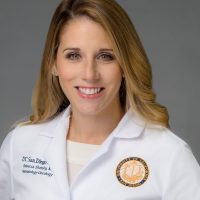
Rebecca Shatsky, MD is a medical oncologist specializing in the treatment of breast cancer at the University of California, San Diego. She conducts clinical and translational research at UC San Diego Moores Cancer Center. She is the principal investigator of many clinical trials and is a national clinical operations co-chair of the I-SPY 2 trial. Her translational research focuses on the treatment of triple negative breast cancer, lobular breast cancer, and breast cancer brain metastases/leptomeningeal disease. Dr. Shatsky completed a hematology/oncology fellowship at UC San Diego School of Medicine, her internal medicine residency at the UCLA David Geffen School of Medicine and earned her medical degree from the Keck School of Medicine. She is board certified in internal medicine, hematology and medical oncology and her work has been published in JAMA Oncology, Cancer Cell, and Molecular Cancer Therapeutics, among others.
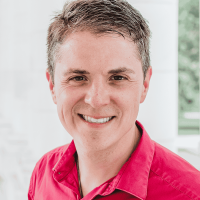
Matthew J. Sikora, PhD, Assistant Professor of Pathology at the University of Colorado Anschutz Medical Campus, focuses his ILC research on the unique biology of the estrogen receptor (ER) in ILC, working to define how ER drives ILC growth, and to understand the pharmacology of estrogens and anti-estrogens in ILC. The mission of the Sikora Lab is to develop new treatment strategies to stop anti-estrogen resistance in ILC, while working with advocates to focus on the priorities of people with ILC. More …

Peter Simpson, PhD, Associate Professor at University of Queensland Centre for Clinical Research (UQCCR), holds a joint teaching and research position where he is Head of the Cancer Theme and is a Research Group Leader at UQCCR. He is a Senior Lecturer in the Discipline of Pathology, where he teaches on the Faculty of Medicine MD Program. Dr Peter Simpson holds a BSc Honours degree and a PhD in Molecular Biology from the University of Liverpool in the UK. More …

Christos Sotiriou, MD, PhD, Head of the J.C. Heuson Breast Cancer Translational Research Laboratory, Institut Jules Bordet, Université Libre de Bruxelles (ULB), Brussels, Belgium; Head of Clinic at the Medical Oncology Department, Institut Jules Bordet; Research Director (tenured position) at the Belgian Fund for Scientific Research – FNRS (October 2017) leads a very successful research group that has contributed seminal and practice-changing results in breast cancer translational research. More …
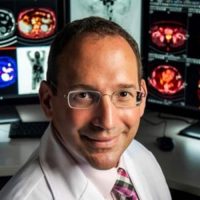
Gary A. Ulaner, MD, PhD, Chair of Molecular Imaging and Therapy at Hoag Family Cancer Institute and the James & Pamela Muzzy Endowed Chair of Molecular Imaging and Therapy Professor of Radiology and Translational Genomics, University of Southern California, is dual board-certified in radiology and nuclear medicine, and focuses on FDG PET/CT and novel radiotracer development for patients with breast cancer. Dr. Ulaner is the principle investigator of multiple prospective clinical trials of novel PET radiotracers for people with breast cancer. More …
Emeritus Members

Otto Metzger, MD, Past Chair of LBCA SAB and Breast Oncology Center at Dana-Farber/Brigham and Women’s Cancer Center, is a clinical investigator focused on the development of therapies for breast cancer treatment. His principal research effort is focused on investigating two subtypes of breast cancer: invasive lobular carcinoma (ILC) and HER2+ breast cancer. He also maintains an active clinical practice in the Breast Oncology Center at Dana-Farber/Brigham and Women’s Cancer Center. More …

Jorge S. Reis-Filho, MD PhD FRCPath, holds a joint medical degree from University of Porto, Portugal and Universidade Federal do Parana, Brazil. After finishing his histopathology training at the Institute of Molecular Pathology and Immunology, University of Porto, Portugal, he did his PhD on breast cancer molecular pathology at the Breakthrough Research Centre at The Institute of Cancer Research/ Royal Marsden Hospital in London, UK, where he was appointed Team Leader of the Molecular Pathology Laboratory in 2006. In 2007, Dr. Reis-Filho was awarded the CL Oakley Lectureship by the Pathological Society of Great Britain and Ireland and the BACR Translational Research Award. More …

Nancy E. Davidson, MD, Executive Vice President, Clinical Affairs; Senior Vice President, Director, and Professor, Clinical Research Division; and Raisbeck Endowed Chair for Collaborative Research, Fred Hutchinson Cancer Center. As a practicing medical oncologist, Dr. Davidson frequently cares or consults for women with lobular breast cancer, and as a clinical researcher, she has been a leader in the development of clinical trials for lobular breast cancer including the current TBCRC trial. In addition, Nancy’s lab researches how hormones, particularly estrogen, affect gene expression and cell growth in endocrine responsive breast cancer, a type of breast cancer which includes most invasive lobular breast cancers. She is intent on understanding the signaling pathways that might be unique to ILC and collaborates with other researchers in the field including Dr. Steffi Oesterreich on such investigations.

Christopher I. Li, MD, PhD, Professor in the Public Health Sciences Division and Vice President for Faculty Affairs and Diversity at Fred Hutchinson Cancer Research Center, Research Professor in the University of Washington Department of Epidemiology, and Associate Director of Diversity, Equity and Inclusion for Fred Hutch/UW/Seattle Children’s Cancer Consortium. He is a cancer epidemiologist with research projects spanning cancer early detection/screening, etiology, and survivorship. He has significant expertise in cancer epidemiology and substantial experience in the design, leadership, and completion of multidisciplinary studies of cancer. More …

Steffi Oesterreich, PhD – LBCA Scientific Advisory Board Founder, Professor and Vice Chair of Pharmacology at the University of Pittsburgh, Co-Leader of the Cancer Biology Program at the UPMC Hillman Cancer Center, and Co-Director Magee Womens Research Institute, is a researcher with an interest in endocrine resistance in breast cancer, with a focus on invasive lobular breast cancer. She is passionate about increased understanding of development and progression of ILC, and enjoys working in multidisciplinary teams, along with patient advocates, with the ultimate goal to decrease suffering from this disease. More …

